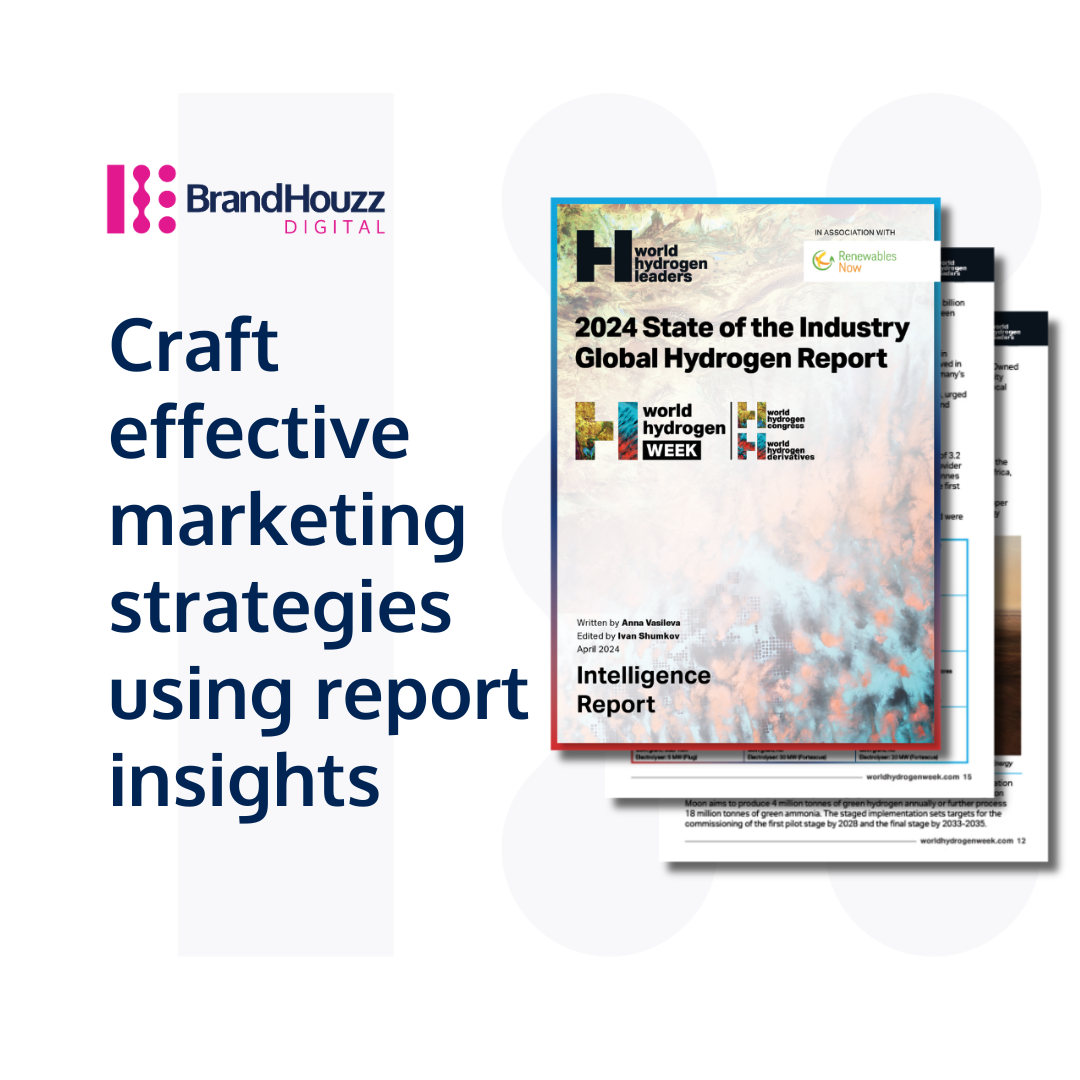
Craft effective marketing strategies using insights of the “2024 State of the Industry Global Hydrogen Report”
October 1, 2024
As the global drive for decarbonization accelerates, the hydrogen market is heating up with immense potential. Yet, for many businesses, figuring out how to tap into this burgeoning sector can be a bit of a puzzle. With 2025 on the horizon, the industry still faces key hurdles—whether it’s navigating tricky regulations, securing the right financing, or forming the partnerships needed to land those crucial offtake agreements.
At BrandHouzz, we’re already working with clients who are diving into hydrogen production, storage, and other parts of the supply chain, keen to seize the opportunities this market offers.
This guide, based on insights from the 2024 State of the Industry Global Hydrogen Report, offers practical advice for businesses looking to establish themselves in the hydrogen sector. It focuses on seven key areas that can help companies effectively market their services and grow in this fast-evolving industry. Ready to get started? Let’s dive in!
1. Position as Problem Solvers for Emerging Challenges
- Address Regulatory Uncertainty: Companies can market their ability to navigate the evolving regulatory landscapes in major regions like the EU, the US, and Asia. Highlighting a deep understanding of complex regulations, such as compliance with renewable fuel standards (RFNBO in the EU, 45V tax credits in the US), demonstrates expertise and positions the company as a trusted partner in project development and execution.
- Overcome Infrastructure and Supply Chain Barriers: Companies can promote their ability to address key infrastructure challenges (e.g., pipelines, storage, electrolyser tech) by offering innovative solutions that mitigate risks. Positioning themselves as experts in the technical aspects of hydrogen projects helps build credibility.
2. Showcase Experience in Securing Financing and Offtake Agreements
- Highlight Offtake Agreement Expertise: Since securing offtake agreements is critical for financing hydrogen projects, companies can market their track record or expertise in negotiating these deals. Offering consulting services for companies needing help securing long-term contracts, or acting as intermediaries in connecting producers with buyers (refineries, ammonia producers), can provide valuable support to stakeholders.
- Promote Access to Financing: Firms with experience in securing FID (Final Investment Decision) can market themselves as financial facilitators. They should emphasize the ability to package projects with government grants, subsidies, or investment programs like those offered under the US IRA, EU IPCEI programs, or Australia’s Hydrogen Headstart Programme.
3. Emphasize Sustainability and Decarbonization
- Focus on Hard-to-Abate Sectors: Highlight the use of hydrogen in decarbonizing industries that cannot easily switch to electricity, such as steel, cement, or heavy-duty transport. By showcasing their hydrogen solutions as critical for meeting global net-zero goals, companies can position themselves as essential players in helping industries transition away from fossil fuels.
- Green Credentials and Compliance: Companies that can demonstrate their projects meet or exceed emissions standards should market their compliance with leading green hydrogen metrics, such as low lifecycle GHG emissions. Emphasizing certifications and adherence to global standards will attract environmentally conscious investors and clients.
4. Capitalize on Market Growth and Regional Opportunities
- Region-Specific Marketing: Tailoring marketing to target the distinct priorities of key regions can increase relevance:
- In Europe, emphasize solutions that align with REPowerEU and IPCEI initiatives for hydrogen production.
- In the US, market expertise in securing benefits under the IRA’s hydrogen tax credits and the development of hydrogen hubs.
- For Asia and South America, focus on supporting large-scale green hydrogen projects and export capabilities, capitalizing on growing demand for hydrogen in markets like Brazil, Chile, and China.
- Promote as First Movers in Growing Markets: Companies can advertise their early entry into untapped or growing markets (e.g., Africa, South America), where hydrogen production is still in its infancy but has enormous potential. By positioning themselves as pioneering contributors to new markets, they can attract partnerships and investments.
5. Leverage Strategic Partnerships and Innovation
- Offer Collaborative Solutions: Marketing efforts should emphasize the company’s ability to partner with other hydrogen ecosystem players, such as electrolyser manufacturers, infrastructure developers, or renewable energy suppliers. Co-branded initiatives or partnerships can bolster credibility and highlight the company’s role in large-scale projects.
- Highlight Innovation and Technological Leadership: Companies should promote any advancements in electrolyser technology, storage solutions, or fuel transportation. Differentiating through technological innovations that improve efficiency or reduce costs can position them as leaders in hydrogen’s evolving technological landscape.
6. Engage in Thought Leadership and Industry Events
- Thought Leadership Content: Create content that educates potential clients and stakeholders about hydrogen’s potential and the company’s unique role in the industry. Publishing white papers, blogs, or case studies that detail how your company helps overcome industry hurdles like regulatory compliance, financing, or technology implementation positions the company as an expert.
- Attend and Market Participation in Key Events: Events like the World Hydrogen Week are important networking platforms. Companies should promote their involvement in these industry events, where they can meet stakeholders, showcase innovations, and position themselves as key players in global hydrogen markets.
7. Appeal to Investors and Financial Institutions
- De-Risking Projects for Investors: Highlight any mechanisms or services that help de-risk hydrogen projects for financial institutions. For instance, companies that can offer insurance solutions, guarantee on-time delivery contracts, or asset-backed financing options should market these as essential tools for attracting investor confidence.
- Green Investment Promotion: Appeal to ESG (Environmental, Social, Governance) investors by highlighting how clean hydrogen projects contribute to decarbonization goals. Emphasize hydrogen’s role in reducing emissions in sectors like steel, cement, and transportation, aligning the company’s services with green investment trends.
By utilizing these insights from the report, companies can strategically market their services, build strong reputations in the hydrogen sector, and attract the partnerships, investors, and clients needed to scale and succeed in this rapidly growing industry.
You can download a printable version of this guide from this link.